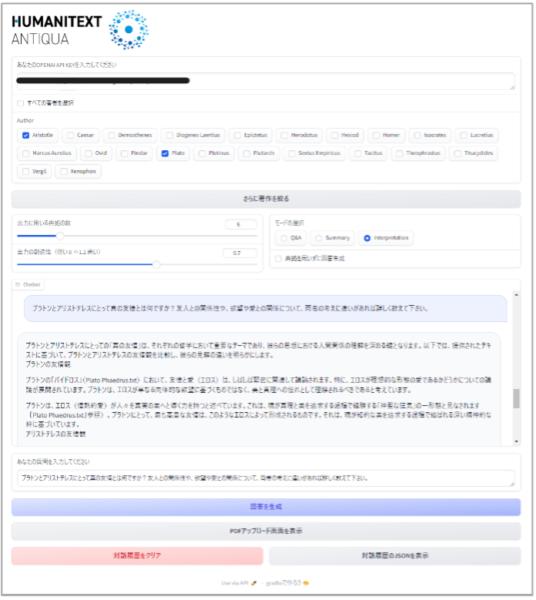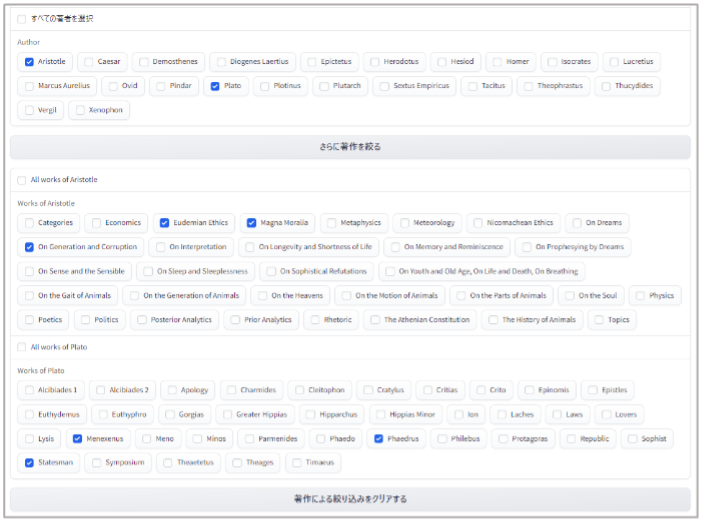
“How did you feel just before you drank the poison?” An AI has been developed that can converse with Socrates!
“Socrates, I’ve had my heart broken and I can’t get over it. What should I do?”
And so a chatbot has been born that can ask Western philosophers for advice on their lives.
A research team from Nagoya University, J. F. Oberlin University, and the National Institute of Informatics (NII) recently announced the development of a new AI dialogue system called “Humanitext Antiqua” that specializes in Western classical studies.
Humanitext covers a wide range of words from ancient Greek philosophers and Roman emperors, and answers questions based on the original texts.
Philosophy is often seen as somewhat complicated, but using Humanitext, anyone can easily enjoy conversations with great people.
An AI dialogue system specializing in Western classical studies has been developed!

Since the launch of ChatGPT in November 2022, AI technology that generates sentences according to user requests has been attracting attention around the world.
The core technology is the “large-scale language model (LLM).”
This is a system that trains AI using large amounts of text data, allowing it to understand the words we use with high accuracy and generate them freely.
“GPT-4,” released by the US company OpenAI in March 2023, is a generative AI that uses this technology, and many people enjoy using GPT-4 to have conversations and create images.
On the other hand, the introduction of generative AI has lagged significantly behind in the humanities, which are represented by history, philosophy, and literature.
The reason for this is that, compared to other academic fields, there were concerns about the reliability of the learning data used by AI and there was a high risk of generating incorrect information.
The research team has now developed a new AI dialogue system called “Humanitext Antiqua” that solves these problems.

HumanText is a generative AI specialized in the field of Western classics, and it covers a wide range of data on original texts and related materials from ancient Greece and Rome.
At present, all works by 22 authors are available, including the poems of Homer and Virgil, the histories of Herodotus and Thucydides, and the philosophical works of Plato and Aristotle.
(※ In preparation for future public release, we plan to complete the integration with all works by major authors of Western classics.)
Since only reliable text data is used as the source of information, it is possible to output answers that maintain academic standards while preventing the AI from using false information that is different from the facts circulating on the Internet.
In addition, information on the original text from which the answer is taken is also displayed at the same time, so users can easily check the accuracy of the output at any time.
Let’s take a look at how HumanText can be used.
If you ask Socrates a question in rap, will he answer you in rap?
First of all, in HumanText, you can freely select “Authors and works”.
If a user wants to hear an answer from Plato, he can base the answer on “Apology of Socrates,” even though he has a vast collection of works.
Apart from this, it is also possible to select multiple authors and works at the same time.
For example, it is possible to select Plato and Aristotle and ask for explanations of the differences between their ideas.

You can also control various levels of output from HumanText (see image below).
For example, “Number of sources to use in output” sets how many contexts to explore in response to a user’s question (currently ranging from 1 to 25).
And for “output creativity,” a lower setting will output answers that are faithful to the context explored, while a higher setting will give you more creative answers that are based on that context.
 Output levels can be controlled in various ways / Credit: NII – Can you ask Socrates for advice on life using generative AI? Developing a dialogue system that contributes to the dramatic development of Western classical studies (2024)
Output levels can be controlled in various ways / Credit: NII – Can you ask Socrates for advice on life using generative AI? Developing a dialogue system that contributes to the dramatic development of Western classical studies (2024)
Next is a wide range of “mode selection” to meet the needs of users.
“Q&A mode” presents information and sources on questions that users want to know.
For example, it can accurately answer questions such as “What kind of monster did Hercules, who is also the subject of a Disney movie, fight?” or “How did ancient people take baths after reading the manga ‘Thermae Romae’?”
Then there is the “expert interpretation mode,” which outputs in-depth content such as detailed linguistic analysis and interpretation of the original text related to the user’s expert questions.
For example, it provides specialized and advanced answers to philosophical questions such as “How did Plato and Aristotle perceive ‘knowledge’?”, referring to the original Greek text.
And then there is the “dialogue mode,” which can be enjoyed casually by the general public.
In this mode, users can interact with the great person based on the original text of the author they select, as if they were actually having a conversation with that great person.
Let’s take a look at a sample dialogue.
For example, the following question is asked of Socrates.
“What was Socrates thinking right before he drank the poisoned cup? https://t.co/B2WLrVEWdt” / X
It’s as if Socrates himself is responding through his mouth.
What’s interesting is that if you ask a question in rap style, it will respond in rap style.
Here is a rap battle challenge to the legendary ancient Greek poet Homer.
“Yo, Homer, if you appeared in our world, you would definitely be an epic MC. What kind of hot rap would you show us? We want to hear it! Surprise us! https://t.co/cqrFAiZn2e” / X
She also has troubles with the unrequited love of the ancient Roman emperor Marcus Aurelius.
“Your Majesty Emperor Marcus Aurelius, I was heartbroken yesterday and I am so distressed that I can’t sleep. I would appreciate your advice on what to do. https://t.co/onbPhfX4Wu” / X
You can see other dialogue samples on the official Human Text X (formerly Twitter) here.
Human Text is a groundbreaking AI system that allows anyone to easily enjoy unique dialogues with great people by significantly lowering the barrier to Western classics, which were previously difficult for amateurs to approach.
The researcher says:
“Western classics are the source of knowledge for the West and all of humanity, and we hope to expand the opportunities for many people to gain inspiration from this legacy of the past through this system.”
Human Text will be open to the public at the Japan Society for Western Classics on June 1-2, 2024, and is scheduled to be open to the public around summer.
Nazology: “How did you feel just before drinking the poisoned cup?” AI developed to converse with Socrates!
